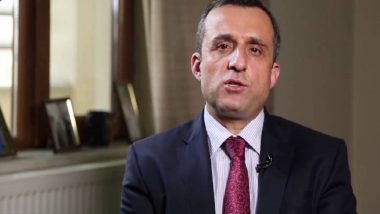Washington, March 15: The issue of Pakistan Army's support to the Taliban and other terror groups should be included in the Afghan peace talks and they must come clean on the scope and scale of their destructive relationship, Afghanistan’s former Interior Minister Amrullah Saleh has demanded. His statement comes as the U.S. government is negotiating with the Taliban to end the 17-year war in Afghanistan.
"There is a pan Afghan demand that the issue of the sanctuaries in Pakistan and the support by the Pakistan Army for the Taliban and other terrorist groups... be included in the agenda (of peace talks)," was former interior minister of Afghanistan Amrullah Saleh's message to a Washington audience.
"The Taliban and Pakistan government must come clean on the scope and scale of their destructive relationship. All dark layers of this bloody conflict which has left deep scars in the body and the psyche of our nation has to be addressed and our allies must stand on our side in honour of our continued sacrifices so we discuss these matters ourselves," in his address to the Hudson Institute think-tank. The prepared remarks of Saleh was read by Husain Haqqani, the former Pakistan ambassador to the U.S., as the Afghan leader could not come to the U.S. due to last-minute issues.
"We understand that the U.S. has initiated direct talks with the Taliban and Khalilzad tweeted after sixteen days of secret talks in Doha that he has reached an agreement with the Taliban on a draft agreement. Did the Taliban also represent global terrorism in the talks? We don't know," he said.
Saleh, who was country's interior minister from December 2018 – January 19, said that there is no substitute and alternative to the direct talks between the Afghan Government and the Taliban. Without direct participation of the Afghan state negotiation will not only be counterproductive but also in violation of all the UNSC resolutions, Saleh said.
Earlier this month, a high-powered American delegation led by Special US Representative for Afghanistan Reconciliation Zalmay Khalilzad held marathon meetings in Doha, Qatar with a high-level Taliban delegation led by Mullah Abdul Ghani Baradar.
The talks have been going on for several days to finalise a draft agreement on a potential foreign troop withdrawal from Afghanistan and to end the 17-year war in the country.
Saleh reminded the Washington audience that the era of Taliban regime was an era of ungoverned Afghanistan dark and inaccessible, he said adding that the territory they control today is nothing different from the 90s and the harsh rules they enforce has not changed. "We therefore appeal to the world community not to undermine our collective achievements and thus not give un-needed and un-necessary elevation to a terrorist group which has done nothing to prove itself otherwise," Saleh said.
Meanwhile, Afghanistan government has slammed the Trump administration for holding direct talks with the Taliban and described it as "surrender discussion" with the terror outfit and warned that such an effort would not result in peace in this war-torn country.
In a hard-hitting speech at the think-tank, the Afghan National Security Advisor Hamdullah Mohib cautioned the U.S. not to take its relationship with Afghanistan for granted as he completely opposed the ongoing direct talks. "It is not a fixed partnership. It is open to review and should be reviewed as contexts change," he said, adding that there is a much better and less expensive way to withdraw troops from Afghanistan, if that is the objective, rather than surrendering before a terrorist outfit like the Taliban for that purpose.
Mohib warned the United States that peace in Afghanistan will not emerge out of any back-door deal between the Taliban and any entity that is not the Afghan government. "The Afghan government is the only legitimately elected representative of the Afghan people and there is no substitute for that," he said.
"We will continue to defend our democratic gains whether the US forces stay or withdraw from Afghanistan. And we will not seek a replacement should the United States choose to withdraw. We believe that as long as the threat of terrorism remains a global one, Afghanistan will remain an important ally, and that is not bound to change even if peace with the Taliban is achieved," Mohib said. The capable Afghan forces, he said are prepared to protect the country.













 Quickly
Quickly





















